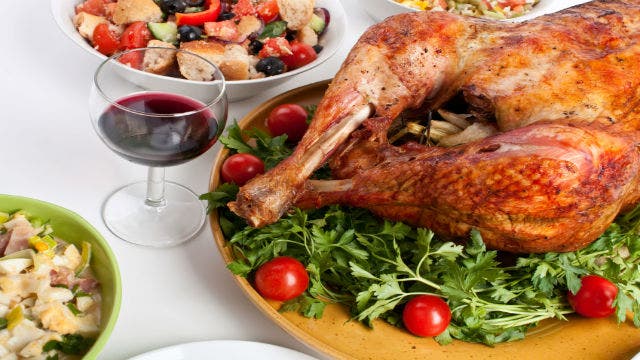Can the holidays hurt your heart?
Over the holidays, the combination of too much food and alcohol can lead to a serious condition known as
The holiday season is upon us, and many Americans will be gathering for lots of parties, large meals and family gatherings over the next few weeks. Thanksgiving, Hanukkah, Christmas and New Year’s Eve often involve consuming excessive food and alcohol. While fun, these traditions can actually result in negative health effects— some temporary, others permanent.
Holiday heart syndrome is a real and serious medical phenomenon that occurs when we consume large amounts of food, alcohol, caffeine and salt. One symptom of the condition is heart rhythm disturbances, including atrial fibrillation— the most common heart rhythm disorder. In atrial fibrillation, the heart beats rapidly and in an irregular fashion. Atrial fibrillation can result in health complications including stroke. Holiday heart syndrome can also lead to a weakened heart— a condition called cardiomyopathy— congestive heart failure (CHF), and even heart attack.
For the most part, holiday heart syndrome can be induced by consuming excess alcohol and food. The condition is often associated with holiday-time stress. Caffeine and dehydration can also play a role.
Here’s how these common holiday habits can impact your heart:
Overeating
Eating a large amount of food in one sitting causes the stomach to expand to accommodate large, indulgent meals. This distention of the stomach can result in a stretching reflex that stimulates the nervous system and initiates fast heart rhythms such as atrial fibrillation.
Consuming too much salt
We need salt, but when we consume too much, our bodies can hold onto fluid and cause our blood pressure to rise. In people with a history of high blood pressure, heart valve problems, or heart failure, the increase in blood pressure and higher amount of fluid in the body can also precipitate atrial fibrillation. People with CHF should avoid consuming excess salt, as this can increase the chance of heart failure, and cause shortness of breath and swelling.
Binge drinking
While some research shows that consuming alcohol— particularly red wine— is good for your heart, most studies suggest that for alcohol to be heart-healthy, consumption must be in moderation.
When we drink in excess, alcohol can become cardiotoxic, and weaken our hearts and cardiovascular systems. When the heart muscle weakens, heart pressure increases, and the upper chambers stretch and develop atrial fibrillation. This scenario is uncommon, but excessive alcohol exposure over the holidays commonly causes an acute effect on the heart rhythm— resulting in atrial fibrillation.
Other possible causes of atrial fibrillation after heavy alcohol consumption are due to surges in the body’s adrenaline and other stress hormones. This sudden surge in stress hormones can precipitate cardiac arrhythmias and can lead to heart attack in high-risk individuals.
Common symptoms of holiday heart syndrome
You may have holiday heart syndrome if you have a rapid pulse rate, shortness of breath, chest pain, or swelling in the ankles or feet. In some cases of the condition, the heartbeat can become so fast that the person may pass out, a condition referred to as syncope. In severe cases, heart attacks can occur.
Not coincidentally, heart attacks are common during the holidays— they’re most common on Dec. 25, followed by Dec. 26 and Jan. 1.
If you have any holiday heart syndrome symptoms— chest pain, shortness of breath, dizziness, an abnormal heart rate, or if you pass out— during the holidays or otherwise, call 911 or go to the hospital immediately.
Dr. Kevin Campbell is the author of “Women and Cardiovascular Disease”, and an assistant professor of medicine in the division of cardiology at University of North Carolina at Chapel Hill. For more from Dr. Campbell, visit his website DrKevinCampbellMD.com.









































